A
Auto Express
Guest
Prices and specifications for the new Dacia Sandero have been confirmed – and the hatchback has managed to hold its ground as the UK’s most affordable new car. Prices start from just £7,995 for the Access model, climbing to £13,395 for the flagship Stepway Prestige variant.
The fourth-generation Sandero is available to pre-order in the UK now, with a deposit of just £99. First deliveries are expected to arrive during April next year, and when the first examples reach the UK they’ll be offered with three years’ free servicing.
Standard equipment for the entry-level Sandero Access includes automatic LED headlights, 15-inch steel wheels, front electric windows and a phone-docking station with a dedicated smartphone app, which takes the place of an integrated infotainment system.
Dacia’s mid-range Essential model starts from £8,995 and adds plastic wheel covers, body-coloured bumpers and remote central locking. Inside, buyers get an adjustable steering column, manual air-conditioning, a USB port and a DAB radio with Bluetooth connectivity.
The Sandero Comfort starts from £11,595. Upgrades over the Essential variant include 15-inch alloy wheels, body-coloured, electrically adjustable wing mirrors, keyless entry, parking sensors, a reversing camera and an eight-inch infotainment system with integrated sat-nav.
Alongside the conventional Sandero range, Dacia has also introduced a new version of the SUV-inspired Stepway model. This features chunky body cladding, 16-inch alloy wheels, roof bars, and metal skidplates built into the front and rear bumpers. The Stepway also rides 41mm higher than the regular hatchback.
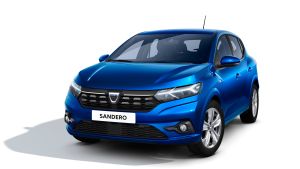
image
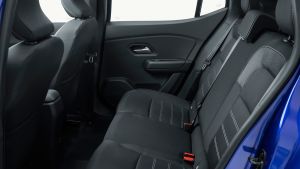
image
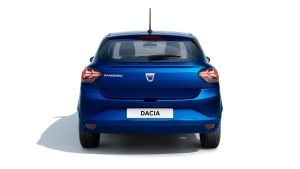
image
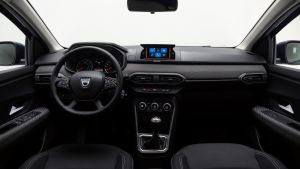
image
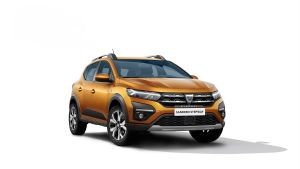
image
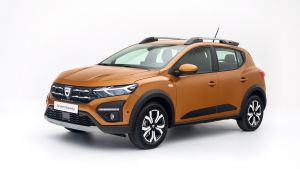
image
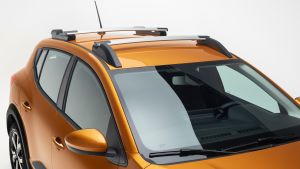
image
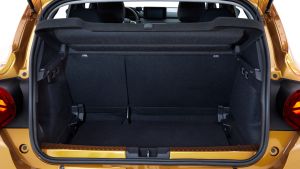
image
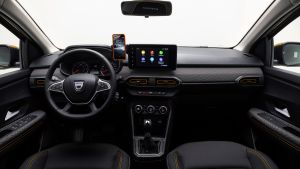
image
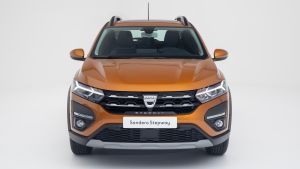
image
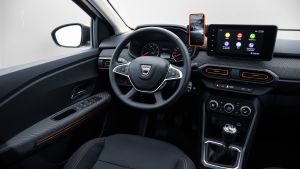
image
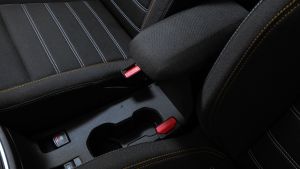
image
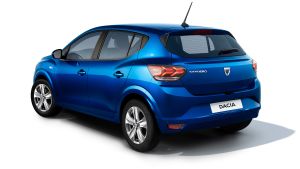
image
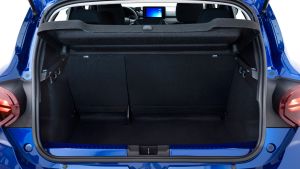
image
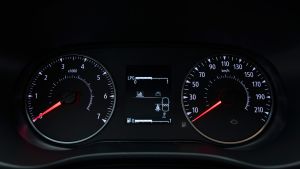
image
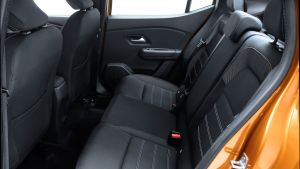
image
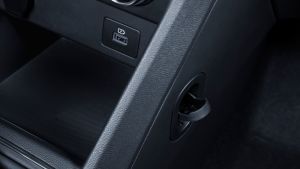
image
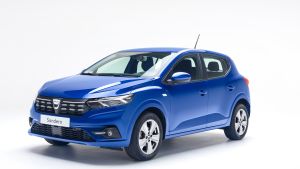
image
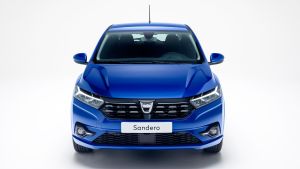
image
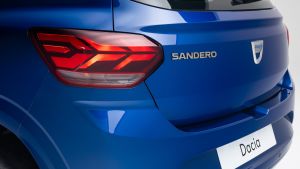
image
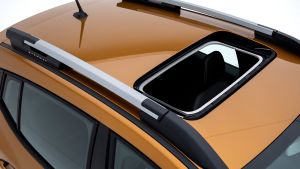
image
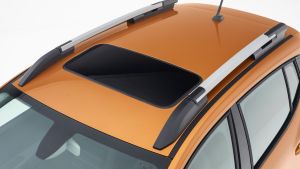
image
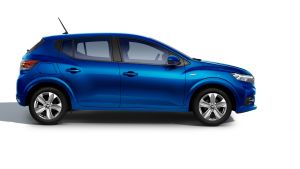
image
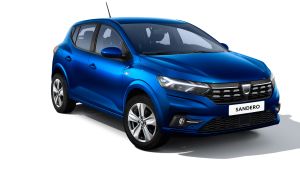
image
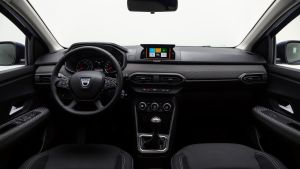
image
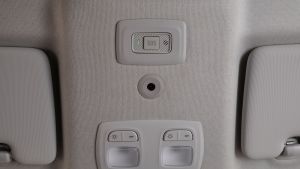
image
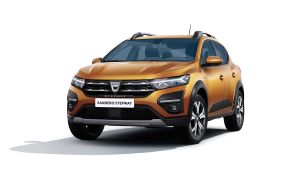
image
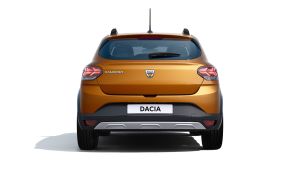
image
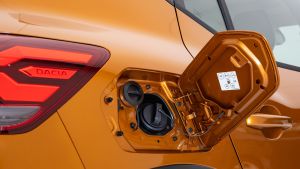
image
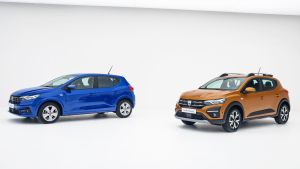
image
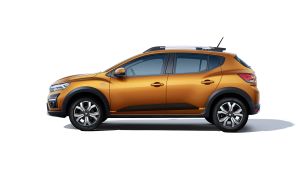
image
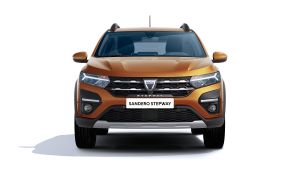
image
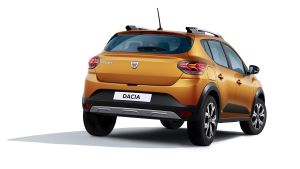
image
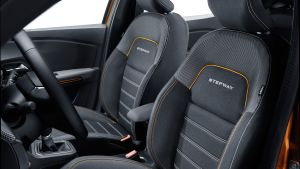
image
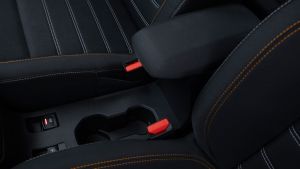
image
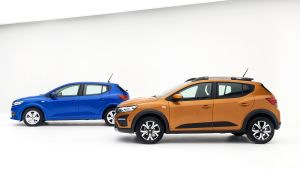
image
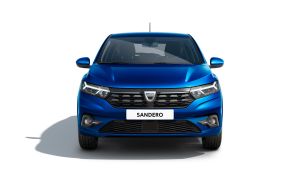
image
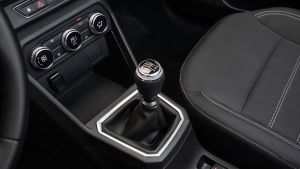
image
Prices start from £10,995 for the entry-level Stepway Essential. With the exception of the new alloys and body trim, it features the same equipment as the equivalent Sandero. Prices rise to £12,595 for the Stepway Comfort, which adds a leather steering wheel and modular roof bars that can be transformed into a roof rack
The summit of the Sandero line-up is the Stepway Prestige. This is priced from £13,395 and features heated front seats, climate control, front parking sensors, a blind-spot warning system and a centre console with an integrated armrest and storage bin.
Sandero buyers have their choice of three petrol engines, all of which are based on the same 1.0-litre three-cylinder unit. The entry-level TCe 65 variant develops just 64bhp and 95Nm of torque, which brings a 0–62mph time of 16.7 seconds and a top speed of 98mph. It’s mated to a five-speed manual gearbox as standard.
Dacia offers a turbocharged version of the same engine, which sees power rise to 89bhp and torque to 160Nm, shortening the Sandero’s 0–62mph time to 11.7 seconds in the process. Top speed stands at 111mph – and, like the base-model, fuel economy is a claimed 53.3mpg.
The most potent version of the 1.0-litre engine available is an LPG bi-fuel derivative, which generates 99bhp and 170Nm of torque when running on gas. Dacia says the benefit of the LPG system is lower CO2 emissions compared to a conventional petrol engine – the brand claims figures of 109g/km, compared to 120 g/km for the 89bhp car.

image

image

image

image

image

image

image

image

image

image

image

image

image

image

image

image

image

image

image

image

image

image

image

image

image

image

image

image

image

image

image

image

image

image

image

image

image

image
There’s a range benefit, too: when both tanks are brimmed and used in parallel, the bi-fuel Sandero can cover as much as 800 miles between fuel stops – enough to drive the length of Britain with 200 miles of fuel to spare.
After years of using Renault’s ageing Mk3 Clio platform, the latest Sandero has switched to the French firm’s newer CMF-B underpinnings. Despite that, the new Sandero’s styling is evolutionary, with a Y-shaped LED light signature at the front, and a wider track that gives a stronger look.
There’s a more comfortable shape for the door handles and, at the rear, the old-fashioned boot release is retained only on basic editions, with the rest of the range switching to a more discreet electric unit integrated into the lower tailgate. The car is 19mm longer overall than before, at 4,088mm, but noticeably wider, at 1,848mm not including the mirrors.
There’s arguably a bigger design shift for the Sandero inside. The outgoing car’s rather basic dashboard has been replaced by an altogether more modern design, which features fabric finishes on some higher trim-levels.
The cabin also has more space than before, with a few extra millimetres of shoulder and elbow room for front passengers, and more than four centimetres of extra kneeroom for those in the rear. Boot capacity is 328 litres – a gain of 18 litres over the old Sandero’s.
There’s no word yet on Euro NCAP safety ratings – one of the old Sandero’s weakest points. But the modern platform, standard auto emergency braking and the addition of two new airbags (bringing the total to six) could deliver a respectable score. A senior source said, however, that the company is “not going to go for a top rating.”
Click here to read our in-depth review of the previous generation Dacia Sandero...
Continue reading...
The fourth-generation Sandero is available to pre-order in the UK now, with a deposit of just £99. First deliveries are expected to arrive during April next year, and when the first examples reach the UK they’ll be offered with three years’ free servicing.
- SEE MORE Best hatchbacks to buy 2020/2021
Standard equipment for the entry-level Sandero Access includes automatic LED headlights, 15-inch steel wheels, front electric windows and a phone-docking station with a dedicated smartphone app, which takes the place of an integrated infotainment system.
Dacia’s mid-range Essential model starts from £8,995 and adds plastic wheel covers, body-coloured bumpers and remote central locking. Inside, buyers get an adjustable steering column, manual air-conditioning, a USB port and a DAB radio with Bluetooth connectivity.
The Sandero Comfort starts from £11,595. Upgrades over the Essential variant include 15-inch alloy wheels, body-coloured, electrically adjustable wing mirrors, keyless entry, parking sensors, a reversing camera and an eight-inch infotainment system with integrated sat-nav.
Alongside the conventional Sandero range, Dacia has also introduced a new version of the SUV-inspired Stepway model. This features chunky body cladding, 16-inch alloy wheels, roof bars, and metal skidplates built into the front and rear bumpers. The Stepway also rides 41mm higher than the regular hatchback.

image

image

image

image

image

image

image

image

image

image

image

image

image

image

image

image

image

image

image

image

image

image

image

image

image

image

image

image

image

image

image

image

image

image

image

image

image

image
Prices start from £10,995 for the entry-level Stepway Essential. With the exception of the new alloys and body trim, it features the same equipment as the equivalent Sandero. Prices rise to £12,595 for the Stepway Comfort, which adds a leather steering wheel and modular roof bars that can be transformed into a roof rack
The summit of the Sandero line-up is the Stepway Prestige. This is priced from £13,395 and features heated front seats, climate control, front parking sensors, a blind-spot warning system and a centre console with an integrated armrest and storage bin.
New Dacia Sandero: engines and drivetrains
Sandero buyers have their choice of three petrol engines, all of which are based on the same 1.0-litre three-cylinder unit. The entry-level TCe 65 variant develops just 64bhp and 95Nm of torque, which brings a 0–62mph time of 16.7 seconds and a top speed of 98mph. It’s mated to a five-speed manual gearbox as standard.
Dacia offers a turbocharged version of the same engine, which sees power rise to 89bhp and torque to 160Nm, shortening the Sandero’s 0–62mph time to 11.7 seconds in the process. Top speed stands at 111mph – and, like the base-model, fuel economy is a claimed 53.3mpg.
The most potent version of the 1.0-litre engine available is an LPG bi-fuel derivative, which generates 99bhp and 170Nm of torque when running on gas. Dacia says the benefit of the LPG system is lower CO2 emissions compared to a conventional petrol engine – the brand claims figures of 109g/km, compared to 120 g/km for the 89bhp car.

image

image

image

image

image

image

image

image

image

image

image

image

image

image

image

image

image

image

image

image

image

image

image

image

image

image

image

image

image

image

image

image

image

image

image

image

image

image
There’s a range benefit, too: when both tanks are brimmed and used in parallel, the bi-fuel Sandero can cover as much as 800 miles between fuel stops – enough to drive the length of Britain with 200 miles of fuel to spare.
New Dacia Sandero: design and platform
After years of using Renault’s ageing Mk3 Clio platform, the latest Sandero has switched to the French firm’s newer CMF-B underpinnings. Despite that, the new Sandero’s styling is evolutionary, with a Y-shaped LED light signature at the front, and a wider track that gives a stronger look.
There’s a more comfortable shape for the door handles and, at the rear, the old-fashioned boot release is retained only on basic editions, with the rest of the range switching to a more discreet electric unit integrated into the lower tailgate. The car is 19mm longer overall than before, at 4,088mm, but noticeably wider, at 1,848mm not including the mirrors.
There’s arguably a bigger design shift for the Sandero inside. The outgoing car’s rather basic dashboard has been replaced by an altogether more modern design, which features fabric finishes on some higher trim-levels.
The cabin also has more space than before, with a few extra millimetres of shoulder and elbow room for front passengers, and more than four centimetres of extra kneeroom for those in the rear. Boot capacity is 328 litres – a gain of 18 litres over the old Sandero’s.
There’s no word yet on Euro NCAP safety ratings – one of the old Sandero’s weakest points. But the modern platform, standard auto emergency braking and the addition of two new airbags (bringing the total to six) could deliver a respectable score. A senior source said, however, that the company is “not going to go for a top rating.”
Click here to read our in-depth review of the previous generation Dacia Sandero...
Continue reading...
